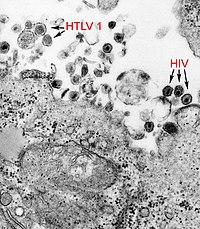
Photo from wikipedia
AIMS In July 2022, the human monkeypox virus was declared by the World Health Organization, a public health emergency of global concern. This study investigated the Filipinos' knowledge of monkeypox… Click to show full abstract
AIMS In July 2022, the human monkeypox virus was declared by the World Health Organization, a public health emergency of global concern. This study investigated the Filipinos' knowledge of monkeypox and determined the demographic variables that predicted it. DESIGN Correlational and cross-sectional design adhering to STROBE guidelines. METHODS Participants were recruited conveniently through social media platforms (n = 575). This study used a 21-item monkeypox knowledge survey questionnaire to collect data from July to September 2022. Logistic regression analysis was used to analyse the data. RESULTS Most participants (53.74%) were above 30 years old, females (68.87%), residing in Luzon (54.96%), college graduates (61.04%), Catholics (78.61%) and employed (68%). Social media, particularly Facebook (57.91%), is the common source of monkeypox-related information (78.61%). Participants' age (>30 years old) is the only predictor of monkeypox infection knowledge (aOR: 3.13; 95%CI: 1.25-7.87, p = .015). They are three times more likely to be knowledgeable than those under 30. CONCLUSION The findings highlight the importance of evidence-based strategies for increasing public knowledge and awareness. The government, healthcare workers and the public should adopt proactive preventive measures against human monkeypox to prevent future pandemics. PATIENT OR PUBLIC CONTRIBUTION No patient or public contribution has been made in this study. IMPACT STATEMENT What problem did the study address? Assessing people's knowledge about monkeypox will help the government and healthcare workers (HCWs) create policies to prevent the spread of the virus. To the best of my knowledge, this is the first study that used a national online survey to assess Filipinos' human monkeypox knowledge. What were the main findings? Most participants had insufficient knowledge of the monkeypox infection. Participants' primary source of monkeypox infection information is social media, specifically Facebook. Participants older than 30 had higher knowledge of monkeypox infection. Where and on whom will the research have impact? Raising public awareness and knowledge about monkeypox disease prevents viral transmission in the community. HCWs (e.g., nurses, midwives, and doctors) should report monkeypox patients to appropriate health authorities. Standard and droplet precautions should be practiced and taught to the public to prevent the virus' spread. The government and HCWs should intensify monkeypox awareness programs to increase the public's knowledge and awareness of the disease. They can utilize social media platforms to disseminate correct and relevant information.
Journal Title: Journal of advanced nursing
Year Published: 2023
Link to full text (if available)
Share on Social Media: Sign Up to like & get
recommendations!